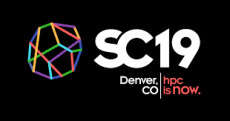SC19 Featured Presentation: Supercomputers and the Superfacility Concept
November 11, 2019
As experimental science keeps producing larger and more complex data sets, there is an urgent demand for new capabilities to transfer, reduce, analyze, store, search, and curate the data to facilitate scientific discovery. “Scientists increasingly need huge, HPC-scale computing resources,” says Debbie Bard, group lead for the Data Science Engagement Group at Lawrence Berkeley National Laboratory’s National Energy Research Scientific Computing Center (NERSC). “At SC, I’m going to be talking about what we see as a solution for the new and growing needs of experimental science—the Superfacility concept.”
Bard will give a featured presentation on this topic in the DOE booth (#925) at SC19 on Tuesday, Nov. 19, 11:30 a.m.
The Superfacility framework integrates experimental and observational instruments with computational and data facilities, giving scientists new ways to access HPC facilities. DOE supercomputing facilities have already begun to expand services and provide new capabilities in support of experiment workflows via powerful computing, storage, and networking systems.
“My talk at SC will focus mostly on the supercomputing aspect of the Superfacility concept, because of course that’s what NERSC does,” says Bard. “But there is much more than just improvements and changes needed in the supercomputing center—the science requirements are driving this work, and this translates into technical innovations across data management, scheduling, networking, and automation.”
Bard stresses that none of these aspects of the Superfacility concept are straightforward, and its success rests in collaboration. “This is certainly not a paradigm that NERSC is alone in facing,” she adds. “This is a paradigm change, and so at SC I want to advertise what types of things this community needs and what needs to happen to support this science, because there will need to be changes across the computing world to make this successful.”
About Computing Sciences at Berkeley Lab
High performance computing plays a critical role in scientific discovery. Researchers increasingly rely on advances in computer science, mathematics, computational science, data science, and large-scale computing and networking to increase our understanding of ourselves, our planet, and our universe. Berkeley Lab’s Computing Sciences Area researches, develops, and deploys new foundations, tools, and technologies to meet these needs and to advance research across a broad range of scientific disciplines.







 Instagram
Instagram YouTube
YouTube